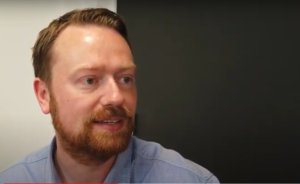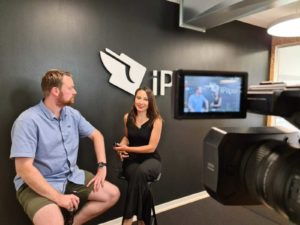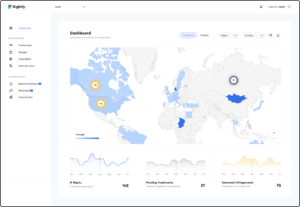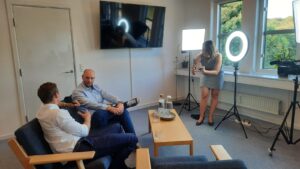The Digital Transformation Show [E5P1]: RightlyIP, fighting counterfeits with a digital platform for intellectual property rights
This time, Edyta Gromacka and I decided to try out a new format with the team at RightlyIP 🤩 We interviewed the CEOs and Founders of this intellectual property rights’ company – Jeppe Hudtloff Viinberg and Bjørn Voldbjerg Sørensen – but we also got the Head of Customer Support Uwe Christiansen and Senior Analyst Thomas Duus to disclose some interesting insights about RightlyIP.
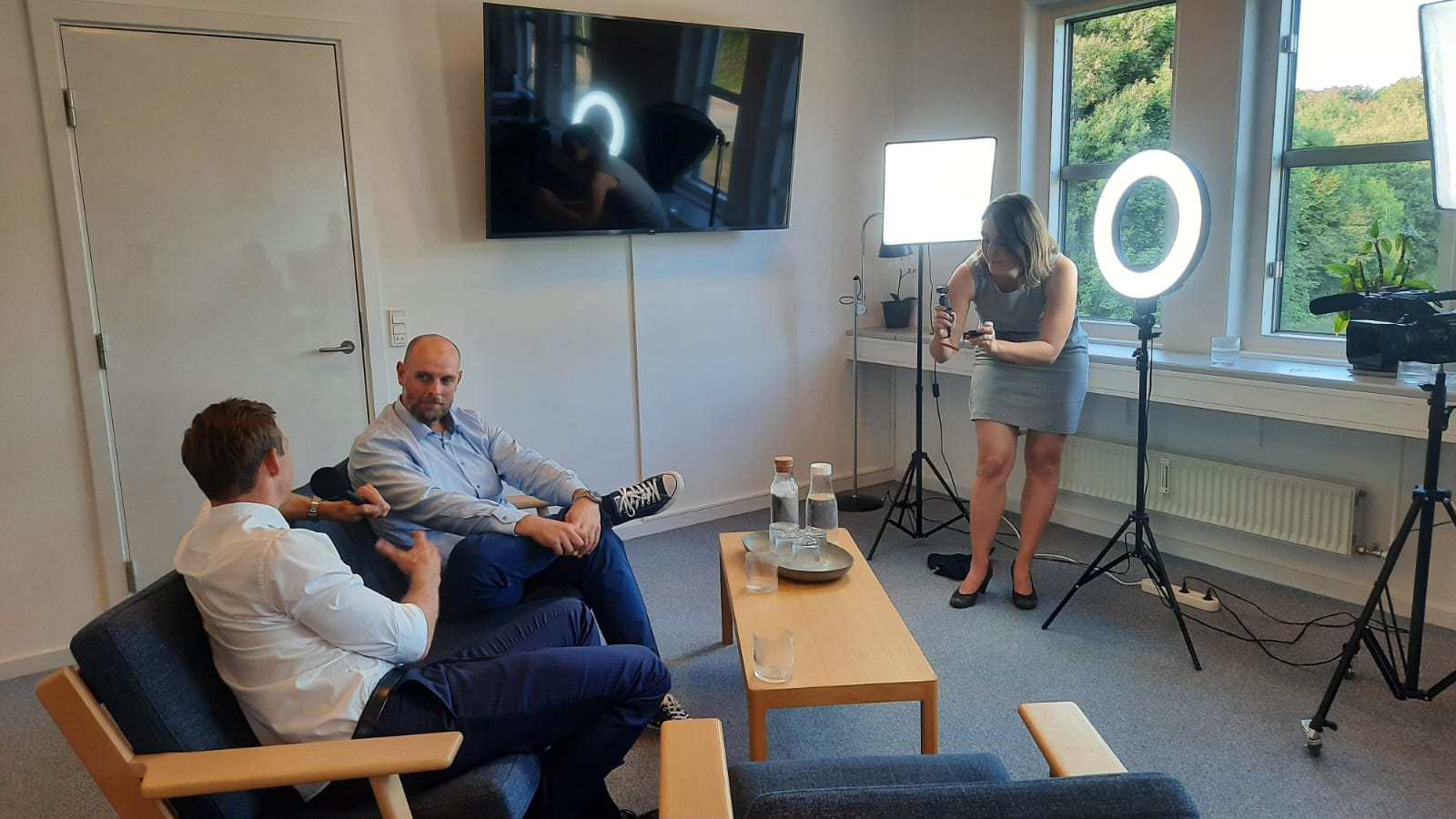
This time, Edyta Gromacka and I decided to try out a new format with the team at RightlyIP 🤩 We interviewed the CEOs and Founders of this intellectual property rights‘ company – Jeppe Hudtloff Viinberg and Bjørn Kunz Petersen – but we also got the Head of Customer Success Uwe Christiansen and Senior Analyst Thomas Duus to disclose some interesting insights about RightlyIP
Watch the video or read the full transcript below.
Estefanía Zárate Angarita: Hello and welcome to one more episode of The Digital Transformation Show. Today, from the offices of RightlyIP, we are going to check out the office, see who is working today and what we can get out of them about this company.
What really makes a digital transformation company be complete, besides the team culture and their concept is to actually have great customer support, and that is something that we have found in all of the companies that we have interviewed so far. So that is why today we are also going to interview the Head of Customer Support at RightlyIP.
What’s your name?
Uwe Christiansen: Uwe. I take care of all of our customers, contacts or clients in the UK, in Denmark, our clients in Germany, so it’s a lot of international, always different and always interesting to work with all the cultures around the globe and just seeing how the world of intellectual property is not ready for what we come with… this is really funny. We are trying to be innovative and coming out with new ideas and really helping people. That’s really great to see.
We are working with the trademark portfolios, so if they don’t renew a trademark that might mean a lot of businesses lost, so we have to make sure that they feel secure every step of the way.
EZA: What do you think has enabled, in this world, to have this opportunity to work with so many countries at the same time?
UC: All people are ready for online meetings. Before it was harder to get people into the right meeting rooms or… But now everybody is so tuned with Zoom or Teams or each meeting system you use. So instead of flying to Germany or flying to Norway, which we have done, we can have the meetings and we can even grow faster and grow better.
EZA: Thomas, I know that by now you know a lot about what is going on in the tech that you’re using but I would like to learn more about… How did you manage to become a part of this company in the first place and how did you learn all this stuff?
Thomas Duus: Bjørn, who is the CEO, was my former online coach at the Aarhus Tigers. I was just studying at the University, studied Multimedia Design and Communications and then Bjørn texted me one day on Facebook that he and his friend started up a new company and they needed some help with web scraping. He asked me, “do you know how to web scrape?” and I didn’t at that time, but of course I never say “no” to a challenge so I told him “yes”, and the rest is history. I’ve been here for three years now.
EZA: And you were the first employee after the founders…
TD: Yeah.
EZA: Congratulations! So how does this actually work? You go online, you run your AI tech, you find the images of the counterfeits and identify them as fakes, and what happens later? What is the process with these big platforms?
TD: There is a lot of data involved for our own platform so we use all the data so the clients can actually log into our platform and get an overview of how many infringements have we removed from either Amazon, Ali Baba, and so on and so forth. So it’s a huge process of not only finding the product but then getting the data down so we can upload it directly into our system.
EZA: So finally after a quick run around the office of RightlyIP, we are going to hear more about the history of the company.
Jeppe Hudtloff Viinberg: Bjørn and I are long time friends, we met when we were in our early 20s and I guess we always knew we were going to do something together, we actually started looking for a small apartment that we would rent to students and that was just before the financial crisis in 2008 and, thank God we didn’t! But we always knew that we were going to do something together.
We started in one room on the second floor, headed to the ground floor and now we have the first and the second.
EZA: So, taking over the world ground by ground.
JHV: Yes!
EZA: Do you think that the fact that you live in Denmark, that you have this so digitalized ecosystem in which doing everything from our phone is so natural nowadays, has somehow contributed to the growth of your company and the creation of itself?
JHV: We have an environment in Denmark that supports startups, for sure. I think that we are so blessed in Denmark, growing up where we are, a secure environment, everything is nice, we have a low crime… all that is nice here in Denmark, so maybe we can focus more on developing stuff.
What we really want to do is to gather lawyers from all over the world, using the Rightly platform, building a society of lawyers, of brand owners, where we can combat these criminals together.
JHV: All the damage to society that comes with counterfeits, and what I would like to call – probably not politically correctly – fakes, fake products that imitate other brands…
Bjørn Kunz Petersen: If you can imitate it the cheapest way possible, that is the same product, and then sell it and make a profit from that, it’s run by criminals. They don’t really care how the profits are made, so to speak.
EZA: I read in some of your data that there are, for example, cosmetics or chemical products that are being produced in a very cheap way and being sold using brand names… How do you think you are actually attacking this?
BKP: Getting to the root of the problem is key here because if you can close down that, then you close down the rest of the chain and then you, in the end, close down the production of it. But of course we are not naive because what we have seen for instance with some of our furniture clients is that then they just switch to other furniture production and we are on a mission to help everyone.
JHV: We just want to spread the word to join the battle. The more we are, the stronger we stand. The data we gather, combining that with our legal registrations and our law data, so to speak, is that we actually provide information to our clients in order to develop their business and maybe find new manufacturers, new solid manufacturers, new partners all over the world and that is also interesting for us.
BKP: Consumers are getting more and more conscious about it, as well as conscious about, “Okay, what is this I’m actually eating? How is this product that I’m using actually produced?”. I think there is a shift in society but some studies also show that there is a far way to go. The consumers still need to be more enlightened about that just because you’re able to buy it in the EU, is not certified. Getting the young kids, from a young age educating them that this is not okay because of… and then explaining why
JHV: If I had one wish for Christmas – I can live with that – it would be that the legislation will actually follow the society better. That we could enforce better, that we had tools available to combat counterfeit and again, I think it’s really important to stress that counterfeit put the money in the hands of criminals but it endangers all of us. Our kids play with the toys that are not regulated, some of us might get medicine that is not regulated and it’s a growing problem because the criminals see this as a great opportunity. I know it’s getting better but there is a long long way to go, and the legislation is too far behind, so we try to combat the counterfeit but they have the advantage because it’s still too difficult to enforce crossborder, cross continent, because the legislation is so very different from country to country.
BKP: That’s where the legal battle is right now and I think that’s very interesting because referring back to combating in China that you go to the root of the problem, because if it’s illegal to store it in your warehouses, you kill the online business of it. Sometimes you need to fight fire with fire and because this is so new, and as Jeppe mentions, the legislation is not always there and we have both with Ali Baba group and with Amazon, we have some dialog going on.
BKP: What do you enjoy the most being here at Rightly.
JHV: I would say the daily business, we have built a business with friends, and the first employee we had was a friend of yours, team buddy. The second employee we had was also a team buddy of yours and being able to convince friends of ours to trust us to build a business together, I think that’s rather unique. You need to have something, I would say, for them to trust us.
Find more information about RightlyIP on their website: https://rightlyip.com/

